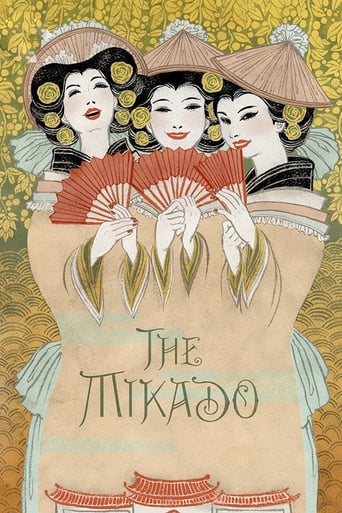Frumious_Bandersnatch_46
I REALLY wish I could give this production 4½ stars. I find that I didn't really like it -- but I didn't really DISlike it, either.At the start, I was SURE that this movie had been "colorized". I checked the date, I checked my screen, I checked the date, I checked my screen. Then I restarted the opening credits and saw it was, indeed, filmed in color -- in 1939.Yes, they cut "I Have a Little List" and a couple of other favorites. And, yes, they chopped quite a lot out of "My Object All Sublime" -- among others. And yes, they switched the order of some them.However, I think today's audiences would prefer the emended "Little List" and "Sublime" to Gilbert & Sullivan's original lyrics. I think this version was filmed BEFORE the "official" amendments to those songs -- to eliminate the N-word.I agree with the reviewer who said that this production is better seen as a visual record of the D'Oyly Carte Opera Company than as excellence in transferring a stage production to film. Now I'm off to find another version to watch. 2011/09/28.
bkoganbing
With the exception of American radio tenor Kenny Baker, the members of the D'Oyly Carte Opera Company are the cast of this filmed production of the Mikado. It was the first technicolor film done in the United Kingdom although in that same year, much better use of color was made in The Four Feathers.A lot of history has passed since The Mikado made its debut in the 1880s. At that time Japan was considered the most exotic place on earth and with good reason. In 1853, the American expedition under Commodore Matthew Perry forcibly opened Japan to the world. Up to that time they had almost completely isolated themselves from the west for over 200 years. Westerners who found there way there, never returned. Only the Dutch had extremely limited trading facilities in Japan for years.When they did open up, the curiosity of the west was unbounded on both sides of the Atlantic pond. In time the British would sign a treaty of alliance to protect each other's Far East interests. When that treaty was not renewed in 1923 it eventually set the two powers on a course for war.But in the 1880s Great Britain was fascinated by things Japanese and Gilbert&Sullivan scored a big old satirical hit with The Mikado. If the music and manners of the cast sound British it's because from the safety of a land during the Middle Ages, the battling partners could get a few barbs in about British society and politics from a very firm safety net. The way Pooh-Bah collects offices and honors with the accompanying salaries was very much in line with the way the British courts over the years rewarded service rendered.Starring in the role of Nanki-Poo the Mikado's son who has run away because he doesn't want to marry some old harpy dad's picked out for him is American radio singer Kenny Baker. He did several films, most notably the Goldwyn Follies where George Gershwin's last song hit during his lifetime, Love Walked In, became permanently identified with him. Baker was a regular on Jack Benny's radio program, later replaced by Dennis Day. Later on Baker scored a big hit on Broadway with Mary Martin in One Touch Of Venus. No doubt for reasons of export the British producers chose Baker to have some recognizable name away from the D'Oyly Carte regular company who no one on this side of the pond would have known. Baker's light pleasing tenor does justice to the Gilbert&Sullivan patter.The film does lack production values though, it's a photographed performance of the opera. I would have liked to have seen better and outdoor sets possibly, but this is a never-neverland kind of Japan.The Mikado got an Oscar nomination for color cinematography, but was just another casualty to the Gone With The Wind juggernaut of 1939. Still it's an interesting film and Gilbert&Sullivan fans who just care about the music should be pleased.
ian-bond
This is a remarkable film in many ways. The fact that it was shot in the UK in the new (and very vivid) technicolor, was a first for a start, and the preservation of the performances of a number of D'Oyly Carte principals makes this an important historical document. Sydney Granville (Pooh-Bah) had worked with Gilbet himself. Sadly, this seems to be a reissue of the version that was on general release in the cinema. The original cut of the film included a number of sections not present in this release - Ko-Ko's "Little List" song for instance was filmed and certainly was present in the original master copy (a copy of which was in the possession of a late member of the old D'Oyly Carte administrative staff). Hopefully, someday, a copy of the extended version will surface once again.
Ed
This old Technicolor film from 1939 is shown on television quite a lot.Kenny Baker is a taste I never acquired (Dennis Day, his successor on the Jack Benny show was much more bearable.) and, especially in the prologue, he's all over the place. He even sings "The Sun and I" which is one of Yum Yum's songs, though she later sings it as well. Kenny's problem is not only his American accent but his really overripe tenor and equally overripe smile gets quite irritating after a while, at least to me.Despite all this, the film is an important record of the D'Oyly Carte company in 1939 and especially of Martyn Green's performance. And I'm pleased they didn't cut the madrigal. A most interesting film for its time.******* out of ***********


